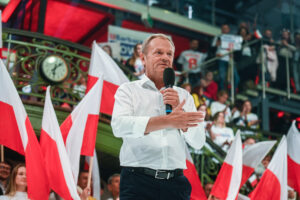On January 1, as the European Union ushered in another year of economic chaos and not-so-distant wars, no one was in the mood to celebrate the euro’s 25th birthday. No one, that is, but the Eurocrats.
As always, the EU’s top brass waxed lyrical about the single currency, but this year their musings sounded more delusional than ever. In an opinion piece published across the eurozone, the presidents of the European Central Bank, Commission, Council, Eurogroup and Parliament praised the euro for giving the EU “stability”, “growth”, “jobs”, “unity” and even “greater sovereignty”, and for being an overall “success”.
Such self-congratulatory back-slapping is common among Eurocrats. In 2016, for example, as Europe was still reeling from the disastrous consequences of the euro crisis, Jean-Claude Juncker, then President of the Commission, said that the euro brings “huge” though “often invisible economic benefits”. This year’s statement, however, had a particularly Orwellian feel to it. The euro has not brought any of those things to Europe: the EU today is weaker, more fractured and less “sovereign” than it was 25 years ago.
Since 2008, the euro area has essentially been stagnating — and its overall long-term growth trend has been negative. This has led to a dramatic divergence between its economic fortunes and those of the US: adjusted for differences in the cost of living, the latter’s economy was only 15% larger than the euro area’s economy in 2008; it is now 31% larger. Today, the euro’s share of global currency reserves is significantly lower than its predecessors — the Deutsche Mark, French franc and ECU — in the Eighties.
But this is far from the only result of the euro’s failure. When it was introduced, it was hoped that the single currency’s “culture of stability” would narrow the difference in terms of its members’ economic performance. In effect, as the IMF has noted, the opposite has happened: “the envisaged adjustment mechanisms under monetary union have been insufficient to support convergence, and have in some cases contributed to divergence”. Added to this, exports between euro nations as a percentage of total eurozone exports have been on a downward trend since the mid-2000s.
It seems clear, then, that the introduction of the euro was a mistake — but only if we take its proponents’ stated intentions at face value. For it is important to understand that the euro was always as much a political project as an economic one. And, from that standpoint, it has been an extraordinary success.
There’s a reason the foundations of the monetary union were only laid in the early Nineties, even though the idea had been around since 1970. That year, the first report examining the feasibility of monetary union was published. Known as the Werner Report, it stressed that, in addition to the creation of a European central bank as the issuer of the new single currency, “transfers of responsibility from the national to the Community plane will be essential” for the conduct of economic policy.
Seven years later, the MacDougall Report reinforced the need for a sizeable EU budget — of 5% or more of EU GDP — to underpin any European monetary union, with responsibility for it handed to a European Parliament. Given the reluctance of member states to move towards a fully-fledged monetary and fiscal union, which would have involved significant transfers between countries, the plans for monetary union floundered for another decade. However, new life was then breathed into the euro project in the late Eighties and early Nineties — not because the economics of the project had improved, but because the politics around the idea of monetary union had changed, especially at the level of Franco-German relations.
The official story is that the French, who had always been particularly reluctant to agree to any supranational authority, came round to the idea of a monetary union in the wake of German reunification, as a way of “shackling” German power. Germany, meanwhile, relinquished its much-loved national currency, the symbol of its post-war economic achievement, in order to quell concerns about its growing hegemony.
The reality, in fact, was more complicated. It is true that France hoped that monetary integration would constrain Germany. But France was also influenced by domestic developments — in particular the French Socialists’ neoliberal turn in the early Eighties, under Mitterrand. This led it to embrace the idea that “national sovereignty no longer means very much” and that “a high degree of supranationality is essential”, as Mitterrand’s finance minister, Jacques Delors, put it — an idea that Delors would then export to the rest of Europe during in his role as President of the European Commission from 1985 to 1995.
As for Germany, the notion that the country reluctantly accepted to have the euro foisted upon itself, in exchange for its European partners’ acceptance of reunification, is largely a myth. German elites were perfectly aware that the eurozone would give an immense boost to Germany’s export-led mercantilist strategy, by ensuring a significantly lower exchange rate with the euro than it would have had with the Deutsche Mark, even in the face of persistent trade surpluses. In other words, the German elites viewed the euro as a way of reasserting their hegemony over Europe — the exact opposite of what the French were hoping to achieve.
For a while at least, history would prove the Germans right. They seized the opportunity to ensure that the future monetary union would be functional to German interests, partly by getting other member states to agree to the creation of a fully independent central bank — that is, fully insulated from a democratically elected polity — with the sole mandate of ensuring price stability. No wonder Helmut Kohl, Germany’s Chancellor, admitted to pushing through the euro “like a dictator” in face of a reluctant public, while Theo Waigel, his finance minister, boasted about “bringing the Mark in Europe”.
Why did other countries agree to join a monetary union destined to boost the German economy at the expense of other less export-dependent economies, such as Italy? There were certainly ideological elements at play, such as the rise of monetarism, but, as with France, the reasons were mostly political rather than economic. By the early Nineties, national elites in most European countries had come to view the euro as a “Trojan horse” with which to push through neoliberal policies for which there was little political support, by engaging in what Kevin Featherstone has called a “‘blameshift’ towards the ‘EU’”.
Moreover, by explicitly prohibiting the ECB from acting as lender of last resort and forcing states to rely solely on loans from the financial markets for their financing needs, the idea was that representative democratic institutions would be subject to the supposed “discipline” of the markets. Angela Merkel coined a rather ominous term for such a system: “market-conforming democracy”.
In short, the euro saw the light of day because national elites came to embrace the idea for different but convergent reasons: in some cases (such as Germany), it was a matter of gaining an economic advantage at the expense of other countries; in others (Italy, for example), it was a matter of gaining an advantage at the expense of domestic actors, even if that cost economic growth.
The result was an extremely dysfunctional monetary union. And when the financial crisis hit, and a series of credit-led economic booms — fuelled by massive capital flows from Europe’s core to the periphery — went bust, the implications of its structure hit home. Those members in a slump could not devalue. Since they could not print their own money, and because the central bank was unwilling to act as lender of last resort, they risked sovereign default, or national insolvency, as they came under attack from financial markets. Essentially, the euro was their downfall.
Yet, by late 2010, European elites — the Germans, in particular — had rewritten history. The financial crisis was not the fault of an out-of-control system exacerbated by the dysfunctional nature of the monetary union; it was, they claimed, the fault of excessive government debt inflated by countries that had “lived well beyond their means”. The fact that most euro countries had registered primary fiscal surpluses in years leading up to the financial crisis, and that public debts had exploded only in the latter’s aftermath as a result of the massive bank bail-outs, was conveniently brushed aside. There was only one possible “cure”, Europe’s leaders proclaimed: austerity. The leading proponent of this theory was Germany’s ultra-hawkish finance minister, Wolfgang Schäuble, who died last week.
The imposition of such harsh fiscal austerity measures across the eurozone didn’t just raise unemployment, erode social welfare, push populations to the brink of poverty and create a genuine humanitarian emergency — it also completely failed to achieve the stated aims of kickstarting growth and reducing debt-to-GDP ratios. Instead, it drove economies into recession and increased debt-to-GDP ratios. Meanwhile, democratic norms were dramatically upended, as entire countries were essentially put into “controlled administration”. The result was a “lost decade” of stagnation and permacrisis that led to a profound divide between the eurozone’s north and south, and brought the monetary union to the brink.
This wasn’t simply the “automatic” outcome of the defective architecture of the monetary union. Rather, the European “sovereign debt crisis” of 2009-2012 was largely “engineered” by the ECB (and Germany) to impose a new order on the continent. Indeed, former ECB president Jean-Claude Trichet made no secret of the fact that its refusal to support public bond markets in the first phase of the financial crisis was aimed at pressuring eurozone governments into consolidating their budgets and implementing “structural reforms”. But the ECB then went further, resorting to various forms of financial and monetary blackmail — most notably in Ireland, Greece and Italy — with the aim of coercing governments to comply with the overall political-economic agenda of the EU.
In this sense, we could say that the euro crisis was both an economic disaster and a political success for Europe’s financial-political elites. After all, it allowed them to radically restructure and re-engineer European societies and economies along lines more favourable to capital, while creating one of the single biggest upward transfers of wealth in history — all in the name of the allegedly inescapable realities of the euro.
Since then, not much has changed in terms of the inner workings of the monetary union. Even the temporary suspension of the EU’s fiscal rules during the pandemic is in the process of being curtailed; a rehashed but fundamentally unchanged version of the EU’s fiscal framework is set to come back into force this year, spelling the return of austerity to the continent. That Germany has fallen from grace in the process, going from unchallenged European hegemon to American vassal-in-chief, is one of the great ironies of the past decade.
Nonetheless, when European elites say that the euro has been a success, they are unwittingly revealing a truth. From their perspective, it undoubtedly has; and their greatest success has arguably been to convince everyone that there is no alternative. To paraphrase Mark Fisher, it’s easier to imagine the end of the world than the end of the euro.
Disclaimer
Some of the posts we share are controversial and we do not necessarily agree with them in the whole extend. Sometimes we agree with the content or part of it but we do not agree with the narration or language. Nevertheless we find them somehow interesting, valuable and/or informative or we share them, because we strongly believe in freedom of speech, free press and journalism. We strongly encourage you to have a critical approach to all the content, do your own research and analysis to build your own opinion.
We would be glad to have your feedback.
Source: UnHerd Read the original article here: https://unherd.com/




